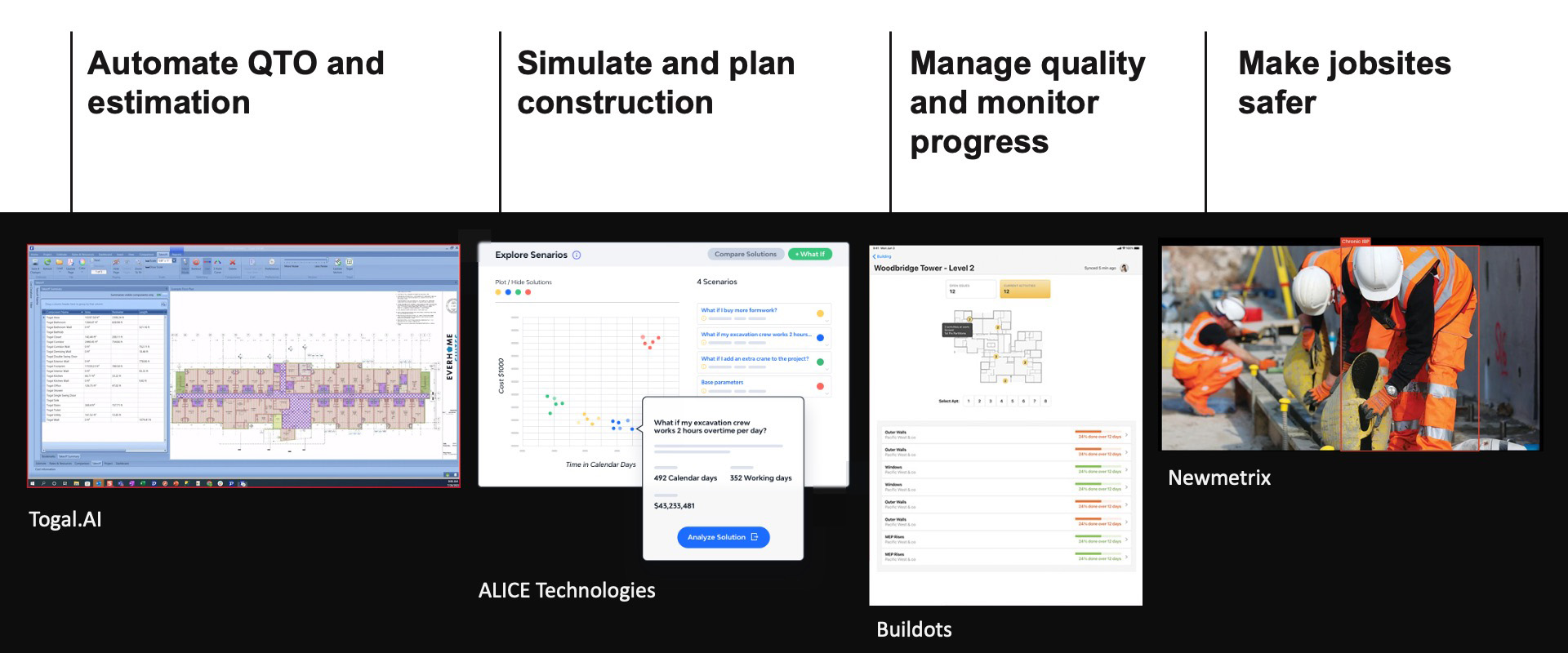AI’s potential in construction is vast, from predictive equipment maintenance to ensuring compliance with regulations. Many construction companies are already testing the waters of AI. However, they are still concerned about data security and the best ways to use AI productively.
In this post, I examine some notable examples of AI in construction and report how Quickbase, the prominent low/no-code application platform provider, empowers its customers with AI.
AI’s Role in Transforming Construction
Regardless of all the digitalization of the last 5-10 years, construction projects are still plagued by fragmented and siloed data, manual data-related processes, and communication breakdowns among multiple stakeholders.
There’s no shortage of digital applications, but as Quickbase’s recent study exposed, 74% of employees see no reduction in manual work. According to the survey, these tedious manual tasks can take over 20 hours per week.
AI can empower solutions to these challenges through automation and advanced data analytics. It can process vast amounts of data to predict project timelines, identify potential risks, and recommend remedial actions, reducing delays and cost overruns.
Automation and Analysis
The decisions contractors make before and at the outset of a project impact the financial outcome the most. Not identifying the risks early on can ruin a project’s profitability.
AI is superior to humans in analyzing large quantities of data. Contractors can use AI-powered tools to automate quantity takeoff and cost estimation work. In my interview with CEO Marty Cornish, he explained how Workpack’s AI pre-construction software can make quantity take-off up to 95% faster. This allows contractors to bid more, improving their success in landing a project.
Large Language Models help identify project risks. Contractors can let AI read all the bidding and contract documentation and identify risks that might otherwise remain unnoticed.
Planning the construction execution is another task that benefits from AI. With the technology, you can run multiple simulations of the project fast and optimize the schedule and use of resources. In my podcast interview with Réne Morkos, he talks about how ALICE allows dynamic “optioneering” of the schedule.

Predictive Maintenance, Safety Compliance, and Progress Monitoring
In an interview with Daniel Faggella, CEO and founder of Emerj AI Research, I asked him about the most promising use cases for AI in construction. He immediately mentioned predictive maintenance. That’s probably because it has proven to be a great use case in other industries.
AI’s predictive capabilities are particularly beneficial for maintenance. By analyzing historical performance data of construction equipment, AI models can forecast when maintenance is required, preventing unexpected breakdowns and extending the lifespan of machinery.
AI can automate compliance with safety regulations. It’s able to embed these safety protocols into project workflows, ensuring that all safety steps are followed meticulously, reducing the risk of accidents, and ensuring regulatory compliance.
During construction, progress and quality monitoring can greatly benefit from AI. It can analyze vast quantities of image and sensor data, creating a dynamic picture of the status or the work on the jobsite. The new Wendy AI of Aiforsite allows the use of natural language to retrieve information about the state of the project.
Buildots, another AI startup, identifies activities that are at risk of falling behind schedule. It quantifies these risks by projecting forecasted delays and recommends pace adjustments to mitigate and prevent delays.
The Elimination of “Gray Work”
Quickbase is on a mission to eliminate “Gray work” in construction. The term refers to inefficient and outdated methods of documenting data or status updates in construction projects, such as spreadsheets, emails, or handwritten notes. These methods waste time and increase the risk of errors and data fragmentation.
The company addresses this issue with innovative AI tools, streamlining processes and enhancing project management efficiency.
Here’s a short overview of their new AI offering. Some tools are in beta; check out their latest status at quickbase.com.
Smart Builder – Build Apps with AI
Quickbase’s Smart Builder leverages generative AI to simplify app creation. Users can build fully functional apps by merely describing the problem they need to solve, making app development accessible to even those without technical skills.
This capability is crucial in the construction industry, where project managers need tailored solutions quickly to address specific challenges.
Data Analyzer – “Data science, without the scientist”
The Quickbase Data Analyzer feature uses machine learning to recognize patterns in data across applications, predicting opportunities to improve productivity. It helps construction managers understand the story behind their data, making informed decisions that drive project success.
Data Scanner for Compliance
Ensuring data compliance and protection is a critical aspect of construction management. Quickbase’s Data Scanner uses AI to create custom scan configurations, identifying sensitive data that might be improperly placed. This proactive data governance approach helps construction companies avoid potential compliance issues, safeguarding their projects against legal and financial repercussions.
AI in Construction: A Practical Guide to Adopting the Ultimate Project and Productivity “Game Changer”
In this video interview recorded at Empower 2024, Isaac Sacolick of StarCIO interviews Anthony Chiaradonna, CIO of Consigli Construction, and me on AI. Anthony explains how they’ve used Quickbase’s AI-powered tools to improve efficiency.


The Broader Impact
Construction companies that improve their productivity and manage risks with AI will eventually gain a competitive advantage. However, investing in AI does not automatically pay off in the short term. Substantial AI projects are still costly, and their outcome is not guaranteed.
Because of the uncertainties in AI development, it’s reassuring that companies like Quickbase are making a considerable effort to turn AI into a functional, everyday tool. By speeding up app development and providing deep data insights, the company enables construction firms to out-innovate their competition.
In a recent Quickbase research, 42% of respondents said privacy, security, and risk concerns are the most significant barriers to adopting AI. Therefore, Quickbase’s commitment to data security and privacy is essential.
As the construction industry evolves, AI and platforms like Quickbase will play an increasingly vital role in driving efficiency, safety, and innovation.
View the original article and our Inspiration here


Leave a Reply